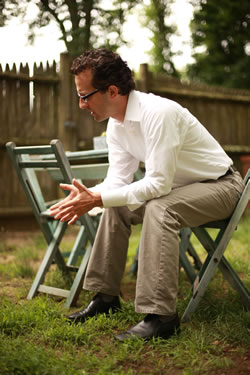|
A student recently asked me if writing ever gets easier. It's just so difficult, she said, then she sat back, folded her arms, and waited. I suspect she wanted to hear some good news, how the young writer continues to read and write and eventually finds the creative process no longer akin to tweezing out portions of one's brain and smearing them onto a blank page. But what a lousy lie that would be. "It" doesn't get easier and may actually get harder (a Clintonian parsing of what "it" means could take up an entire essay), and if "it" doesn't get harder, then the writer has become lazy, and eventually even the hardest-working writer either runs out of endurance, money, or time.
Last month I had dinner with Lawrence Block. Talk turned to writing (as it often does), and Larry offered some sad truths (as he often does): When writers retire, they stop writing. Completely. This is unlike retired painters who still sketch, or retired musicians who still jam with friends, or retired dancers who still habitually exercise every morning. What Larry said made sense. The notion of "writing for pleasure" seems absurd—I finish writing for pleasure, but the act itself isn't pleasurable. Point me to one of those useless New Age-style books on the "joy" of writing and I'll point you to any number of writer's groups where the desperate huddle together because they don't understand why it hurts so much. As if shared suffering will make it any easier. As if the remedy is anything other than starting a story and finishing a story.
Lest you think I'm turning into the sort of writer-as-martyr I loathe (and lest I pass up an opportunity to use lest), let me be clear: I recognize my job is, compared to many jobs, a rare and fortunate thing. It beats the hell out of roofing, mine-sweeping, peep show booth cleaning, and telemarketing. It allows me to work in the comfort of my home, un-showered and un-shaven. It provides status—behold the brilliant author!—and an excuse for any type of bad mood—behold the tortured author!—and whenever I allow myself to reflect on how fortunate I am, how the right blend of talent, perseverance, and more luck than I care to admit allowed me to make decent money off my art, it feels good. More than that: it feels earned, which might be a slightly more tactful way of saying I deserved everything I got.
But let's also be blunt: nobody deserves anything, especially writers. We've chosen a ridiculous profession which actually gets harder the better you become. We wander around with that wrinkled-brow/slightly-dazed look, convincing ourselves that what we do is noble and culture-defining, and whenever the opportunity presents itself—at a reading, during an interview, while writing an essay for some literary journal or providing sage advice for wide-eyed students—we trot out our sway-backed horse, dust off armor that's been paid for by our well-employed spouse, and set off tilting at windmills we built ourselves.
|


